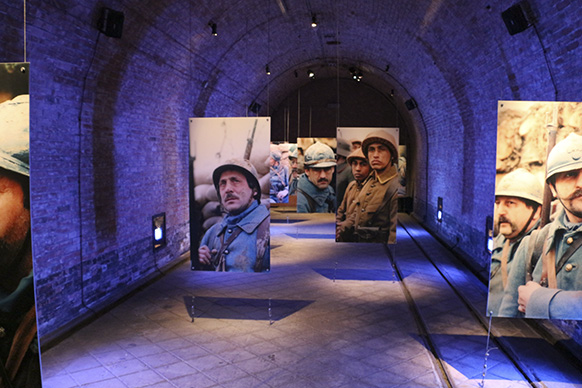
Enduring to the End
There’s been a lot of talk recently about psychological and material challenges because of Covid restrictions. Much hand wringing in the media, anxiety for mental welfare. Many have suffered grievous sorrow and serious personal illness or loss. This is an edited copy of a sermon I gave nine years ago in Middlesbrough. I came across it recently and it seems to be a message for the moment.
During our annual holiday in the Summer of 2012 we had the privilege of visiting the World War I battleground around Verdun. This battle isn’t well known in Britain, because British troops weren’t involved – their fighting was further West in the Somme and the Marne and further North in Flanders. But for the French, Verdun is a legend; a symbol of the finest courage and heroism in the face of overwhelming force. It’s comparable with the Alamo for the Americans, or Rourke’s Drift for the British, or Masada for the Israelis, or the Spartans at Thermopylae. It was the longest battle of the war, lasting ten months in 1916, with 540,000 French casualties and 430,000 German—almost a million men, yet Verdun never fell.
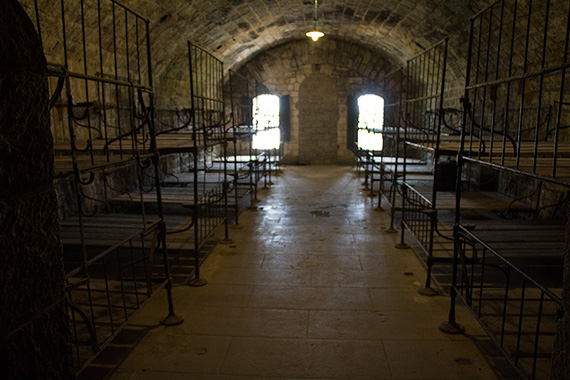
The town of Verdun was defended by a ring of forts. These were cut deep into the rock of the surrounding hills and were miniature underground towns, with hundreds of soldiers living in a maze of tunnels. However, one by one they fell to the Germans. Fort Vaux was the second to fall. In May the garrison there was 670 men, but by June 2,000 shells per hour were raining down on it. The Germans invaded the upper corridors, driving the defenders to the lower levels. They ran out of medical supplies, food, water, and finally their ammunition was gone too. Major Raynal, the fort commander, communicated with headquarters by carrier pigeon; there were no iPhones in those days. His finally message on 4th June reads: “We continue to hold, but we are suffering a very dangerous attack by gas and fumes. It is urgent that we are relieved. Make visual communication via [Fort] Souville which does not answer our calls. This is my last pigeon.” They were not relieved and at 3:50 a.m. on 7th June the fort surrendered.
Even though the forts were defeated, Verdun was not. The Germans got to within 2½ miles of the town but could get no further. Verdun itself, with its own underground fort called the Citadel, stubbornly resisted. Continuing defence was possible only because, unlike Fort Vaux, the town still had a supply line open, to bring out the wounded, and send in reinforcements and supplies. The supply line consisted of a single narrow road; all other routes and railways were cut off but the French managed to keep this one open. It became known as La Voie Sacrée—The Sacred Road. During the battle 6,000 vehicles transported, every week, 90,000 men and 50,000 tons of material. Drivers put in 18 hour days, resting over their wheels to sleep. Transport groups developed an incredible esprit de corps and pride in their gruelling work of salvation for the town. It was the Sacred Road that saved Verdun, supporting the courage and determination of the defenders.
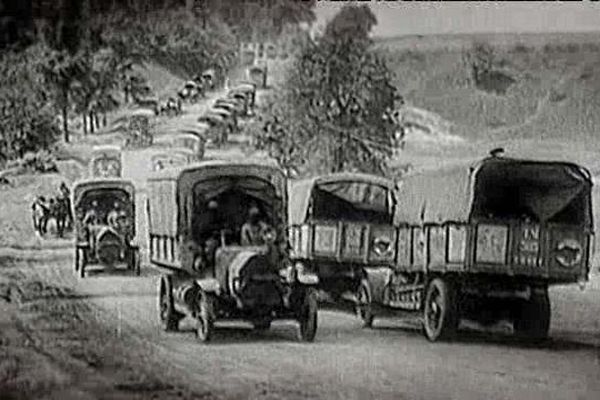
“On ne passe pas” means “they shall not pass”. It’s a slogan used to express determination to defend a position against an enemy. It’s been used many times in many places, but originally and most famously it was the motto of General Robert Nivelle, in the Battle of Verdun during World War I. It is inscribed on the Verdun battle medal.
Do we ever feel like we’ve sent our last pigeon?
Our struggle as individuals trying to live a good life can occasionally seem more than we can cope with. Have you ever felt so tired you just can’t think? Ordinary everyday chores are beyond you. Church work seems an impossible burden and the only option is to retreat into yourself and shut out the world.
Ever felt like that? Well, I’ve got news for you—almost everyone has that experience sometime. I’ve had my share, and I’m in good company. Winston Churchill was tormented by his “black dog”—fits of depression that knocked him down from time to time. Many of the great leaders of the past had to overcome their black dog.
Carrying on, even when feeling utterly hopeless is part of “enduring to the end”. The repetitive, mundane tasks are often the hardest to endure. It feels like our small contribution is so tiny it’s insignificant, unimportant. It seems we keep striving, keep working, but get nowhere. Nothing seems to change much, if anything life gets a little worse. The repetitive grind without visible success is debilitating, continuing on means enduring to the end of hope. But that’s not the case, we aren’t just hanging on, enduring misery until the end of life. Like Verdun, we can continue through the eye of the storm and out the other side. Like Verdun, we all have a Sacred Road that’s always open. We are not alone, left helpless like Fort Vaux.
One of the great classic sermons of the Church was given in General Conference, almost 74 years ago, by J. Reuben Clark Jr., First Counsellor in the First Presidency. He celebrated the hundredth anniversary of the arrival of the Pioneers in the Salt Lake Valley in his talk “To Them of the Last Wagon”. I can share only a little of it.
“I would like to say something about the last wagon in each of the long wagon trains that toiled slowly over the plains, up mountain defiles, down steep, narrow canyons, and out into the valley floor that was to be home—this last wagon: last, because the ox team that pulled it was the smallest and leanest and weakest, and had the tenderest feet of any in the train; it was slow starting, and slow moving; last, because, worn and creaking, it took more time to fix and to grease . . . last, because its wind-rent cover was old and patched and took hours to mend and tie up to keep out the storm; last, because the wife, heavy with child, must rest till the very moment of starting; last, because sickly little Bill, the last born, poorly nourished, must be washed and coaxed to eat the rough food, all they had; last, because with all his tasks—helping little Bill, cooking and cleaning up the breakfast (Mother was not able to help much)—Father took a little longer to yoke his cattle and to gird himself for the day’s labor . . .
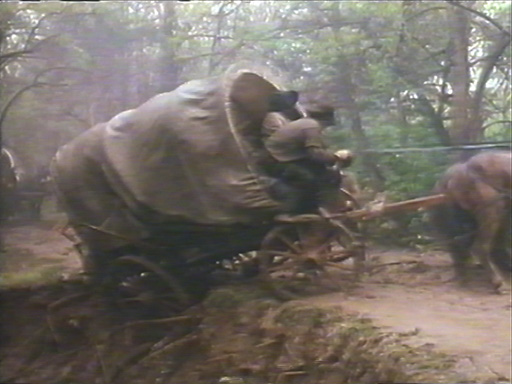
“When the train moved forward in the early morning sun . . . the dust in the still morning air hung heavy over the road. Each wagon from the first stirred up its own cloud, till when the last wagon swung into line, the dust was dense and suffocating. It covered that last wagon and all that was in it; it clung to clothes; it blackened faces; it filled eyes already sore, and ears. The wife, soon to be a mother, could hardly catch her breath in the heavy, choking dust . . .
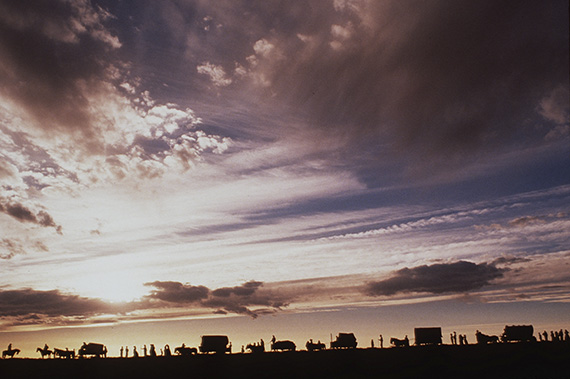
“Then the morning came when from out that last wagon floated the la-la of the newborn babe, and Mother love made a shrine and Father bowed in reverence before it. But the train must move on. So out into the dust and dirt the last wagon moved again, swaying and jolting, while Mother eased as best she could each pain-giving jolt so no harm might be done her, that she might be strong to feed the little one, bone of her bone, flesh of her flesh. Who will dare to say that angels did not cluster round and guard her and ease her rude bed, for she had given another choice spirit its mortal body that it might work out its God-given destiny?
“My mother was one of those babes so born in 1848, ninety-nine years ago.”
(J. Reuben Clark Jr., 1947 General Conference)
Sometimes it might feel like we’re in that last wagon, choked by dust, knocked about by deep ruts in the trail . But we don’t have to stand on the medal platform to be a winner. Being last doesn’t mean losing. By worldly standards Jesus was a big-time loser, but by heavenly standards he was the greatest victor the world will ever know. And because of his victory, we can also be victorious.
“Hast thou not known? hast thou not heard, that the everlasting God, the Lord, the Creator of the ends of the earth, fainteth not, neither is weary? there is no searching of his understanding.
He giveth power to the faint; and to them that have no might he increaseth strength.
Even the youths shall faint and be weary, and the young men shall utterly fall:
But they that wait upon the Lord shall renew their strength; they shall mount up with wings as eagles; they shall run, and not be weary; and they shall walk, and not faint.”
(Isaiah 40:28-31)